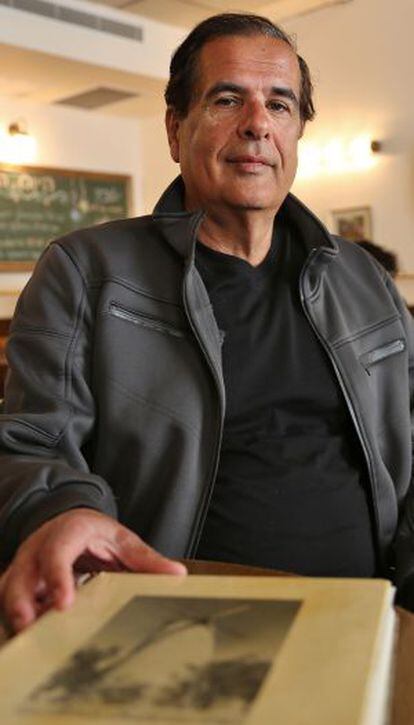Longing for Sefarad — but not enough to go back
A government plan could see descendants of expelled Jews get a chance to apply for citizenship But it is not yet clear how many Israelis could become eligible for Spanish nationality

"Even when we lived in Spain, our sights were already set on Jerusalem." The journey has spanned five centuries and over 4,000 kilometers, and Isaac Levy is not about to retrace those steps. Levy, 68, a retired historian and expert in Sephardic Judaism, owns one of the world's largest collections of songs recorded in Ladino, an old form of Spanish still spoken by the Sephardic community.
His family, the Daças, were expelled from Soria by the Catholic Monarchs in 1492. After living in Greece, family members eventually made it to Jerusalem in the 16th century.
Now, the center-right administration of Mariano Rajoy has decided to offer these descendants of expelled Jews a chance to apply for Spanish citizenship.
Like many other Sephardim, Levy acknowledges that this is an honorable gesture, but does not believe that it constitutes justice for the expulsion. Nor is it going to change his own life in any meaningful way. While the bill - proposed by Justice Minister Alberto Ruiz-Gallardón - has certainly caught the interest of the six million citizens of Israel, the fact is that very few Sephardim are seriously considering leaving a state that was created in 1948 as a home for the Jewish people.
The government made a nice gesture, but Spaniards are too pro-Arab"
Levy shows up for the interview, at a café in Jerusalem, bearing a family book filled with maps, portraits and a Castilian coat of arms, complete with a tower and fleur-de-lys. These are strong documents that would carry a lot of weight if he ever decided to request a Spanish passport. But Levy has his doubts.
"I am too proud to stop being exclusively Israeli," he says. "I love Sefarad , my roots are there. But I will never abandon Israel. The Spanish government made a nice gesture, but we are not well understood in Spain. They are pro-Arab; it pains me to see the way they treat the State of Israel."
Many ancestral songs in Ladino capture the Sephardic longing for a return to Jerusalem, a feeling that would become one of the pillars of Zionism. One of these songs, preserved by the exiles in Turkey and Bulgaria after 1492, goes like this: "Ir me kero madre a Yerushaláyim... A Yerushaláyim lo veo d'enfrente, olvido mis ijos i mis parientes" (I want to go, Mother, to Jerusalem... I see Jerusalem in front of me, and I forget my own children and my relatives).
Right now, the Spanish state grants citizenship to Sephardic Jews on an individual basis, which is highly complex and often requires Cabinet authorization. The new project, if passed, would introduce changes to the civil code to include Sephardim in the group of citizens who are not forced to renounce other nationalities to become Spaniards as well. Levy and other Sephardim could be Israeli and Spanish at the same time. Israel does not demand that its citizens renounce other passports, either.
Without the expulsion from Spain, there would be no state of Israel"
For now, the Spanish government lacks clear criteria to determine which applicants are Sephardic Jews and which are not. The bill says that consulates will have to make the call based on documentary proof such as a certificate issued by the competent rabbinical authority, or a document from the Spanish Federation of Jewish Communities, or ID showing one's surnames. Speaking Ladino will also be considered valid evidence.
Roy Zu-Aretz, 45, has more than enough evidence to apply. First there is his surname, which was originally the very Spanish-sounding Suárez. In 1932, when his forebears arrived in Israel, they changed it to the present form, which is a transliteration of the Hebrew expression for "this land." But Roy Zu-Aretz also happens to speak Ladino, as does his brother. Both men are gifted musicians who have been very successful in Israel with a show that includes traditional Ladino songs.
And then there are the family documents showing that José Suárez was expelled from Spain in 1492, before being driven from Portugal and ending up in the Netherlands. Moisés Suárez, one of his descendants, emigrated to Libya, and from there, Shalom Suárez, Roy's grandfather, made the final journey to what his people consider the promised land.
"Spaniards are like us, warm and familiar," says Zu-Aretz, who lives in Tel Aviv. He has never been to Spain but will be requesting a passport. He seems to harbor no hard feelings over the fact that the Spanish crown expelled his ancestors in a religious purge. "Considering what the Nazis did to Jews in Germany, no. You see things in perspective and at least Spain allowed us to flee. Exile is in the nature of the Jewish people. Without that expulsion, there would be no state of Israel today."
Last week, Israeli media outlets were doing the math based on demographic studies and figured that around 3.5 million citizens could benefit from the Spanish initiative. The announcement triggered a rush to the Spanish consulates in Tel Aviv and Jerusalem. But far fewer people can actually trace their ancestors' journey from medieval Spain to the historical territories of Palestine. Levy figures this number is closer to 50,000. Following the expulsion, most ended up in the Netherlands, the Balkans and Turkey, and many of their descendants - those who maintained their religion in the face of adversity - live in Israel today.










































